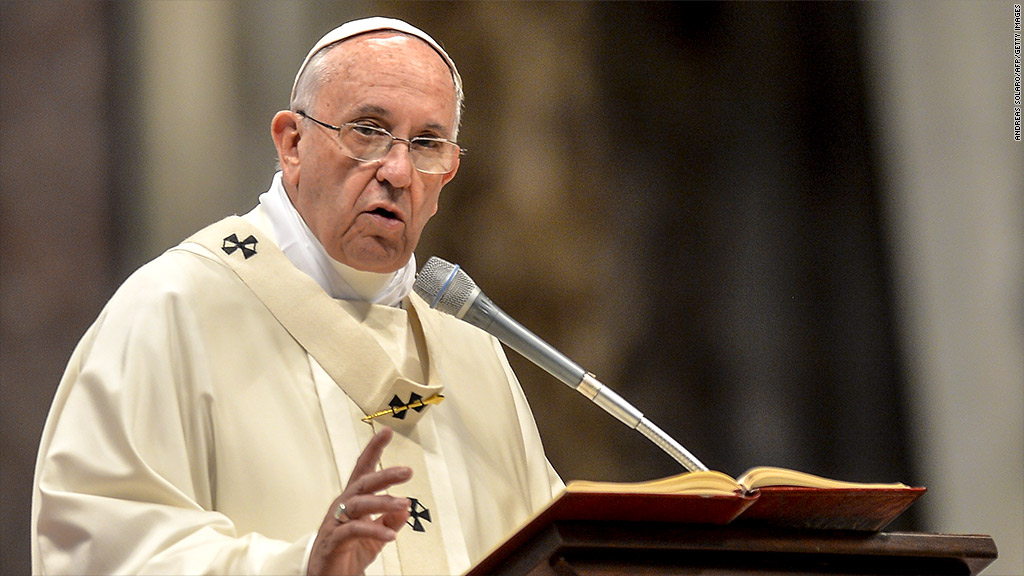
Business leaders often think they are "exempt" from the rules. Technology is not the answer. And consumers, through "moral" purchasing actions, can play a vital role in holding companies accountable.
Pope Francis' encyclical on climate change, released to the world Thursday, includes large sections devoted to the roles of business and technology. Here are some of the key passages:
Profits: "We need to reject a magical conception of the market, which would suggest that problems can be solved simply by an increase in the profits of companies or individuals. Is it realistic to hope that those who are obsessed with maximizing profits will stop to reflect on the environmental damage which they will leave behind for future generations?"
"In a word, businesses profit by calculating and paying only a fraction of the costs involved. Yet only when 'the economic and social costs of using up shared environmental resources are recognized with transparency and fully borne by those who incur them, not by other peoples or future generations,' can those actions be considered ethical."
Pope Francis: 'Revolution' needed to combat climate change
The bailout: "Saving banks at any cost, making the public pay the price, foregoing a firm commitment to reviewing and reforming the entire system, only reaffirms the absolute power of a financial system, a power which has no future and will only give rise to new crises after a slow, costly and only apparent recovery."
"The financial crisis of 2007-08 provided an opportunity to develop a new economy, more attentive to ethical principles, and new ways of regulating speculative financial practices and virtual wealth."
Businesses think they're exempt: "If in a given region the state does not carry out its responsibilities, some business groups can come forward in the guise of benefactors, wield real power, and consider themselves exempt from certain rules, to the point of tolerating different forms of organized crime, human trafficking, the drug trade and violence, all of which become very difficult to eradicate."
Fossil fuels: "We know that technology based on the use of highly polluting fossil fuels -- especially coal, but also oil and, to a lesser degree, gas -- needs to be progressively replaced without delay."
Slow to engage: "In recent decades, environmental issues have given rise to considerable public debate and have elicited a variety of committed and generous civic responses. Politics and business have been slow to react in a way commensurate with the urgency of the challenges facing our world."
Online, social media: "When media and the digital world become omnipresent, their influence can stop people from learning how to live wisely, to think deeply and to love generously. In this context, the great sages of the past run the risk of going unheard amid the noise and distractions of an information overload."
Consumers can change the world: "A change in lifestyle could bring healthy pressure to bear on those who wield political, economic and social power. This is what consumer movements accomplish by boycotting certain products. They prove successful in changing the way businesses operate, forcing them to consider their environmental footprint and their patterns of production."
"When social pressure affects their earnings, businesses clearly have to find ways to produce differently. This shows us the great need for a sense of social responsibility on the part of consumers."
What you buy: "Purchasing is always a moral and not simply economic act."
"A constant flood of new consumer goods can baffle the heart and prevent us from cherishing each thing and each moment."
"Obsession with a consumerist lifestyle, above all when few people are capable of maintaining it, can only lead to violence and mutual destruction."
"Since the market tends to promote extreme consumerism in an effort to sell its products, people can easily get caught up in a whirlwind of needless buying and spending."
Pollution: "The strategy of buying and selling 'carbon credits' can lead to a new form of speculation which would not help reduce the emission of polluting gases worldwide."
"Many cars, used by one or more people, circulate in cities, causing traffic congestion, raising the level of pollution, and consuming enormous quantities of non-renewable energy. This makes it necessary to build more roads and parking areas which spoil the urban landscape."
Innovation can harm: "The social dimensions of global change include the effects of technological innovations on employment, social exclusion, an inequitable distribution and consumption of energy and other services, social breakdown, increased violence and a rise in new forms of social aggression, drug trafficking, growing drug use by young people, and the loss of identity."
"A technological and economic development which does not leave in its wake a better world and an integrally higher quality of life cannot be considered progress."
--CNNMoney's Virginia Harrison contributed to this report from London. Charles Riley wrote from London.


